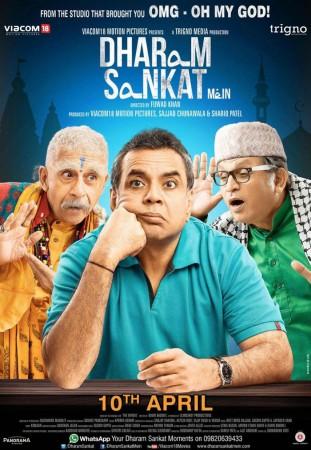
Director Fuwad Khan's Bollywood film "Dharam Sankat Mein" (DSM) starring Paresh Rawal, Naseeruddin Shah and Annu Kapoor in the leads, has received mixed reviews and average ratings from film critics.
"Dharam Sankat Mein" is a comedy film and an official remake of the 2010 British film "The Infidel". The story is about a man who goes through an identity crisis. Dharampal is a married man from a Hindu family. He sets out on a mission to find out his real father, when he discovers that he was born in a Muslim family and was adopted by a Hindu family. His journey creates a laugh riot in the film.
Having touched several religiously sensitive topics, "Dharam Sankat Mein" is a good eye-opener film after "OMG! Oh My God" and "PK". Fuwad Khan has chosen a wonderful concept for the film, but failed to execute the same on screen convincingly, say the film critics, who are impressed with the performance of the lead actors.
"Dharam Sankat Mein" has been rated 2.25 out of five stars. We bring you the some film critics' ratings and verdict on the movie. Continue to read "Dharam Sankat Mein" movie review roundup.
DHARAM SANKAT MEIN should be watched for its sheer simplicity and also for the message that has been conveyed through the film.
Director Fuwad Khan should get the credit for choosing a sensitive subject with the right kind of intention, but unfortunately, the end result is far from what it could have been.
"Dharam Sankat Mein", an official remake of the 2010 British comedy The Infidel, is certainly not half as horrid as the aforementioned monstrosity. But it is not in the OMG league either although that is quite clearly where it aspires to be. On one count at least, this film should pose no sankat to anybody. It is easy to rate "Dharam Sankat Mein: one star for intention, but only half for execution.
The central question this film raises is profound: does the religion you are born into define you for the rest of your life? What if you are not who you believed yourself to be? It articulates the anxieties we live with, and uses the words 'Hindu', 'Muslim', 'Isaai' loudly and clearly, which is a relief because films these days are steering clear of these basic descriptives because we are now a nation of the easily offended. But it doesn't jump into the deep end, carefully skirting the tough questions, and sticks to the majoritarian path, and clichéd representations.
Dharam Sankat Mein would have been a lot easier to digest if the ultimate message had been in sync with his character: the idea that many Indians today use religion as a means to an end, a way to fit in. But the film ends up siding with dharam, not Dharam's sankat (which is to meet his dying father), and sacrifices its emotional raison d'être. By the end, it disintegrates into bland liberal pieties, unconvincing depictions of communal tension and the unrewarding slapstick of the subplot involving Dharam's son and the godman Nirmal Baba (Naseeruddin Shah, parodying MSG, perhaps a touch too much). It's a pity, because when Rawal and Kapoor are on song, you want it to go on forever.
Dharam Sankat Mein had quite an uphill task of balancing comedy and the religious sentiments of its audience. It succeeds fairly well – the jokes are in good taste and the film presents the hypocrisy in blind belief, rather than faith per se.


![Radhika Merchant channelises her inner child as she enjoys Turkish ice-cream date with Anant Ambani in Dubai [Reactions] Radhika Merchant channelises her inner child as she enjoys Turkish ice-cream date with Anant Ambani in Dubai [Reactions]](https://data1.ibtimes.co.in/en/full/806176/radhika-merchant-channelises-her-inner-child-she-enjoys-turkish-ice-cream-date-anant-ambani.jpg?w=220&h=135&l=50&t=40)










![Radhika Merchant channelises her inner child as she enjoys Turkish ice-cream date with Anant Ambani in Dubai [Reactions]](https://data1.ibtimes.co.in/en/full/806176/radhika-merchant-channelises-her-inner-child-she-enjoys-turkish-ice-cream-date-anant-ambani.jpg?w=220&h=135)

